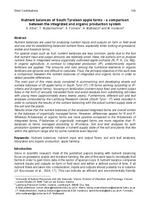Nutrient balances of South Tyrolean apple farms - a comparison between the integrated and organic production system.
Alber S., Mutschlechner T., Forneck A., Matteazzi A., Kelderer M. (2018). Nutrient balances of South Tyrolean apple farms - a comparison between the integrated and organic production system. Proceedings of the 18th International Conference on Organic Fruit-Growing 2018, 159-163.Nutrient balances are used for analysing nutrient inputs and outputs on farm or field level
and are vital for establishing balanced nutrient flows, especially when looking at grassland,
arable and livestock farms.
For special crops such as fruit, nutrient balances are less common, partly due to the fact
that nutrient input and output amounts are relatively small. Here, the authors aim to analyse
nutrient flows in integrated versus organically cultivated apple orchards (N, P, K, Ca, Mg).
In organic agriculture, in contrast to integrated production (IP), predominantly organic
fertilizers are applied. The amounts and ratio among the nutritional elements in organic
fertilizers are dynamic and difficult to calculate. Thus, the principal objective of this work was
a comparison between the nutrient balances of integrated and organic farms in order to
detect possible differences.
The main part of this meta study consisted in summarizing and developing simple soil
surface balances of 28 apple farms in South Tyrol (IT) (19 farms working according to IPcriteria
and 9 organic farms), focusing on fertilization (nutrient input flow) and nutrient output
flows in the form of annually harvested fruits and wood residues from substituting old trees
with young trees (approximately every twenty years). Furthermore, different soil and leaf
analyses conducted by the Laimburg Research Centre (South Tyrol - IT) were included in
order to compare the results of the nutrient balancing with the actual nutrient supply state of
the soil and the plants.
Results show that the nutrient balances of the analysed integrated farms are overall similar
to the balances of organically managed farms. However, differences appear for N and P.
Whereas N-balances of organic farms are more positive compared to the N-balances of
integrated farms, P-balances of organically managed farms are more negative than P-balances
of farms managed according to IP-criteria. Soil and leaf analyses for both
production systems generally indicate a nutrient supply state of the soil and plants that lies
within the optimum range and for some nutrients even beyond.
Documents

|
Nutrient balances of South Tyrolean apple farms - a comparison between the integrated and organic production system. () Alber S., Mutschlechner T., Forneck A., Matteazzi A., Kelderer M. (2018). Nutrient balances of South Tyrolean apple farms - a comparison between the integrated and organic production system. Proceedings of the 18th International Conference on Organic Fruit-Growing 2018, 159-163. |
Links
|
Ecofruit-Proceedings of the 18th International Conference on Organic Fruit-Growing 2018 “Ecofruit” is the continuation of the 17 previous meetings. It aims to bring together European researchers and consultants working on topics related to organic fruit growing. “Ecofruit” gives an opportunity to communicate and discuss latest results connected with organic fruit growing with regard to the improvement of the production system. |
Details
- Activity type
- Publication in scientific journal (peer review)
- Activity work package
- Reduction in pesticide residues
- Activity number
- Laimburg - WP3 - A97
- Activity contact
- Dr. Markus Kelderer
Laimburg Research Centre
Laimburg 6 - Pfatten
I-39040 Post Auer (BZ), Italy
[email protected] - Activity partner
- Laimburg
- Activity country
- Italy
- Last edit
- 23-11-2018

The EUFRUIT thematic network has received funding from the
European Union's Horizon 2020 research and innovation programme
under grant agreement No 696337.
European Union's Horizon 2020 research and innovation programme
under grant agreement No 696337.